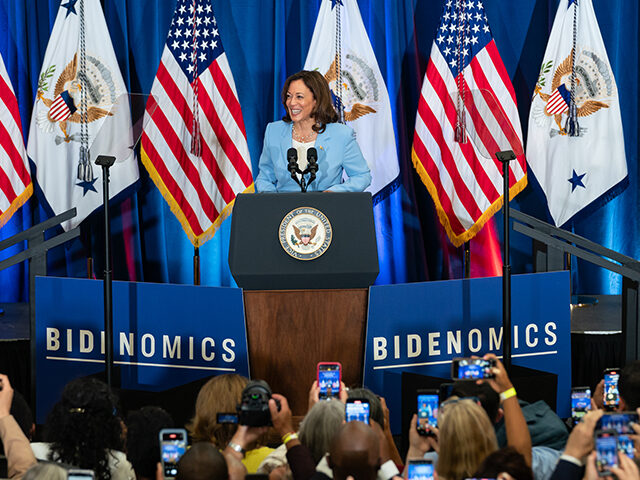Vice President Kamala Harris vowed to reduce grocery costs “when” elected president by “making sure markets are competitive and fair,” drawing criticism from those who pointed out that she has already been in the position to influence markets for over three years.
Following Tuesday night’s roll-call vote at the Democratic National Convention in Chicago, Harris promised to alleviate the rising prices of food to a cheering audience in Milwaukee, where she was holding a rally.
“We believe in a future where we lower the cost of living for America’s families — and when I am president, I will bring down the cost of groceries by making sure markets are competitive and fair,” she said.
“Was there something stopping her from doing that in the 3.5 years she has been in the White House?” the Trump War Room X account asked.
Numerous other X users shared similar opinions:
While the vice presidential office has limited legislative power, Harris has already come out in support of a grocery price-control proposal — a plan she could have worked on with President Joe Biden, agency heads, and the Democrat-led Senate since Inauguration Day 2021.
In a statement to Time magazine last week, the Harris campaign said the presidential hopeful plans to direct the Federal Trade Commission (FTC) and other agencies to investigate and penalize “big corporations” to tackle price fixing and other anti-competitive practices in the food industry.
While Harris’s team acknowledged that “price fluctuations are normal in free markets,” they argued that there is “a big difference between fair pricing in competitive markets, and excessive prices unrelated to the costs of doing business.”
The plan was torn apart by economists and journalists, including Washington Post columnist Catherine Rampell, who argued that it is difficult to overstate just “how bad” it is.
In a piece published Thursday, titled “When your opponent calls you ‘communist,’ maybe don’t propose price controls?” Rampell pointed out the glaring holes in Harris’s proposal.
“What are these ‘clear rules of the road’ or the thresholds that determine when a price or profit level becomes ‘excessive’?” Rampell asked. “The memo doesn’t say, and the campaign did not answer questions I sent seeking clarification.”
“Supply and demand would no longer determine prices or profit levels. Far-off Washington bureaucrats would,” Rampell continued. “The FTC would be able to tell, say, a Kroger in Ohio the acceptable price it can charge for milk.”
Harris still has no policy points listed on her campaign website.

COMMENTS
Please let us know if you're having issues with commenting.